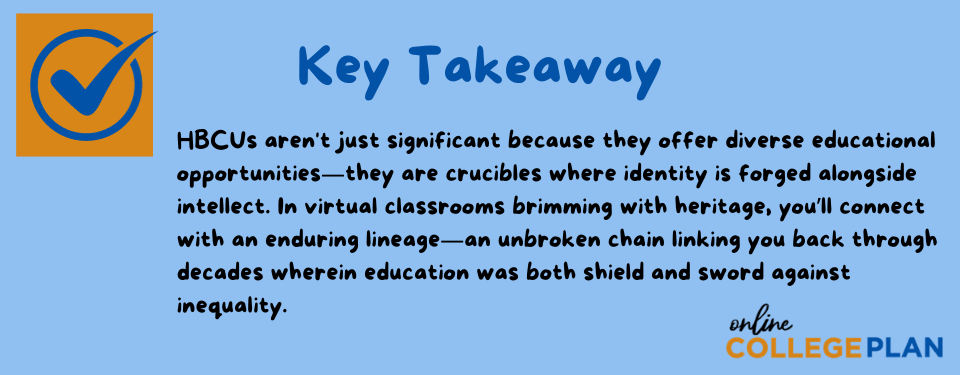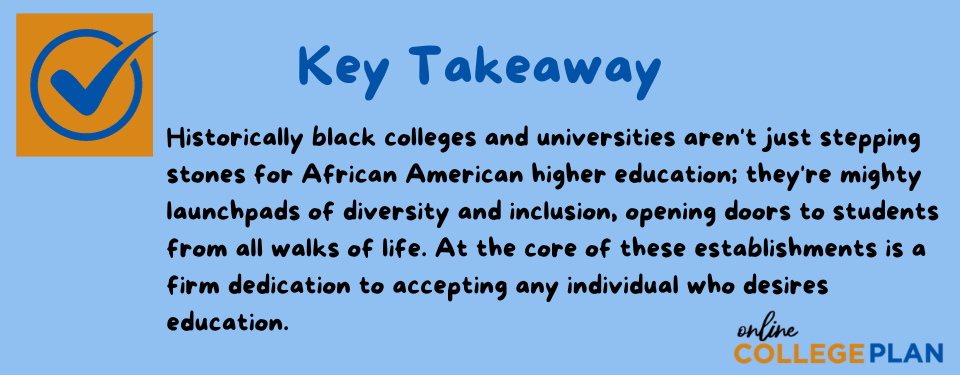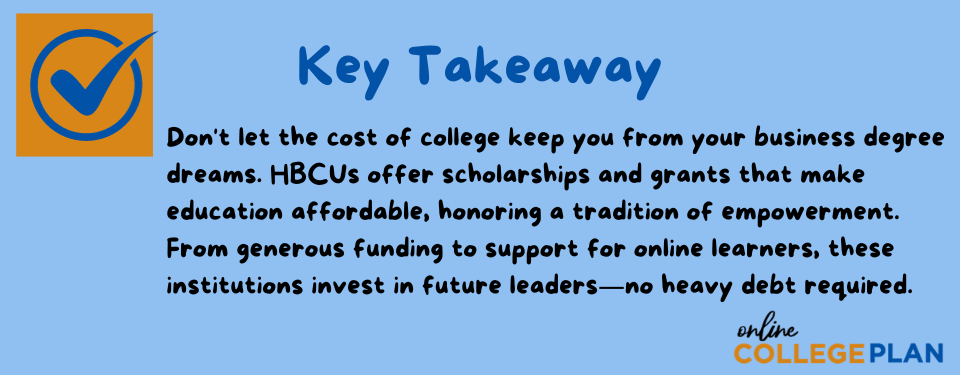Best HBCUs for a Bachelor’s Degree in Business Administration

Find your degree
Are you interested in pursuing an online bachelor’s degree in business at an HBCU? This article has you covered. In it, we feature eight historically black colleges and universities offering undergraduate business degrees online. We’ll examine the details of these programs and what makes each school unique. Plus, we’ll delve into a bit of HBCU history and take a look at the benefits of an online bachelor’s degree in business. Ready to dive deeper? Let’s get started.
The Academic Excellence of HBCU Business Programs
When you choose a historically black college and university for your bachelor’s degree in business administration, you’re not just picking a school; you’re stepping into a legacy. HBCU classrooms echo with the voices of future CEOs and entrepreneurs who share your drive and heritage. It’s more than education—it’s about joining ranks with leaders who’ve shaped history. You’re on the brink of something big—unlocking doors to rigorous academics, networks that lift as they climb, and financial aid tailored just for you, all wrapped up in an experience rich in culture.
When it comes to the business world, a solid foundation is everything. And that’s where HBCUs really shine. The following online business programs do more than just teach you the basics—they prepare you for success in today’s competitive business landscape.
Top Eight HBCUs for an Online Bachelor’s in Business
1. Morehouse College
Atlanta, Georgia

Located in Atlanta, Morehouse College is a private men’s liberal arts college. Founded in 1867, it is affiliated with the National Baptist Convention. This private HBCU is located in downtown Atlanta and has an enrollment of 2,567 undergraduate students. The school boasts a 10:1 student-to-faculty ratio. 85% of the courses at MC are taught by full-time Ph.D. tenured professors. Morehouse states: “We believe in the power of mentorship. Our classes are designed to engage, inspire, and strengthen the relationships between students and educators.”
Morehouse College offers an excellent online Bachelor of Arts in Business Administration with a management concentration. This degree program enables students to cultivate a robust foundation in general business, hone creative problem-solving skills, and acquire the expertise to implement principles of ethical leadership in practical scenarios. Morehouse offers start dates three times a year and full- or part-time study options. This is a degree completion program. So, to enroll, you’ll need some previous college credit. The program requires a total of 120 credits and includes courses such as:
- Data Analytics and Modeling
- Management Decision Science
- Leadership and Professional Development
- Human Resources Management
- Business Policy and Strategy
Accreditation: Southern Association of Colleges and Schools, Commission on Colleges
What Makes Morehouse College Unique? Morehouse is an all-male institution fostering a sense of brotherhood, camaraderie, and a specialized focus on developing African American men as leaders and scholars. Morehouse College boasts an illustrious roster of alumni, counting among its ranks distinguished individuals such as Martin Luther King Jr., Spike Lee, and Samuel L. Jackson.
2. Hampton University
Hampton, Virginia

Hampton University is a private, historically black university in Hampton, Virginia. It was established in 1868 after the American Civil War and the abolition of slavery. General Samuel Chapman Armstrong, a Union Army officer, founded Hampton University with the mission of providing education and training to African Americans and Native Americans. Today, Hampton University is an HBCU with an enrollment of 3,289 students and a 13:1 student-to-faculty ratio.
Hampton U Online offers a 120-credit Bachelor of Science in Business Management. It is crafted to equip adult learners for upcoming managerial roles and offer ongoing educational opportunities for those currently in leadership positions. The curriculum integrates management and administration courses with essential general education requirements. This provides students with a well-rounded education and positions them to thrive in the competitive global job market. It also opens doors to diverse career opportunities in business, government, and education. Some of the course titles include:
- World Civilizations
- Business Organization and Management
- Seminar in Humanities
- Diversity and Global Awareness
- Information/DP Systems Management
Accreditation: Southern Association of Colleges and Schools, Commission on Colleges
What Makes Hampton University Unique? HU has a strong emphasis on science, technology, engineering, and mathematics (STEM) programs. It is home to the Hampton University Proton Therapy Institute, a facility for cancer treatment using proton therapy. Hampton University has produced several notable alumni, including Booker T. Washington, Wanda Sykes, and Alberta Williams King, the mother of Martin Luther King Jr.
3. Tennessee State University
Nashville, Tennessee

“Excellence is our habit” is the motto of Tennessee State University. Founded in 1912 as the Agricultural and Industrial State Normal School, TSU has a rich history of providing higher education to African American students. It is classified as a Carnegie “High Research” University (R2), underscoring its commitment to impactful research and scholarly endeavors. The university enrolls 9,218 students and offers a wide range of undergraduate, graduate, and professional degree programs across various disciplines.
The Department of Business Administration at Tennessee State University offers a Bachelor of Arts in Business Administration with several concentrations. However, the Hospitality and Tourism Management concentration is offered in a fully online format. This concentration equips students for success in the dynamic hospitality and tourism industry, preparing them for roles in hotel management, restaurant management, event planning, travel management, catering, airlines, cruise lines, and various recreational facilities. Featured courses in the degree program include:
- Hospitality & Tourism Professional Skill Development
- HR Management
- Lodging Management
- Business Finance
- Management and Organization Behavior
Accreditation: Southern Association of Colleges and Schools, Commission on Colleges
What Makes Tennessee State University Unique? TSU has received over $100,031,082 in research awards. This funding marks the second-highest total among Historically Black Colleges and Universities (HBCUs) nationwide for the 2022-2023 fiscal year. Tennessee State University is proud to have Oprah Winfrey, Olympic gold medalist Wilma Rudolph, and renowned football coach John A. Merritt as alumni.
4. Alabama A & M University
Normal, Alabama

Alabama A&M University is a land-grant institution based in Normal, Alabama. It enrolls 6,007 students and emphasizes education, research, and outreach in agriculture and the mechanical arts. This year, AMMU celebrates its 150th anniversary. Established in 1875 by Dr. William Hooper Councill, a former slave, the university is a vibrant and forward-thinking institution dedicated to achieving academic excellence.
The Bachelor of Science in Management program at AAMU Online allows students to cultivate essential critical thinking and interpersonal skills, adding substantial value to any organization. The fully online format lets students learn at an accelerated pace and on their own schedules. Some of the required business core courses include:
- Managerial Accounting Principles
- Legal Environment and Ethics
- Business Statistics
- Professional Development and Workforce readiness
- Principles of Finance
Accreditation: Southern Association of Colleges and Schools, Commission on Colleges
What Makes Alabama A&M University Unique? AAMU produces the highest number of minority STEM graduates in the state. An AAMU alumnus, Karla Baker, says: “My commitment to giving back is fueled out of a pure love for the University, a huge amount of gratitude for how attending A&M helped change my life and the responsibility of helping others achieve greater success…. We are truly one Hill and one family.”
5. Delaware State University
Dover, Delaware

For over 130 years, Delaware State University has been a catalyst for turning students’ dreams into reality, standing as one of the nation’s premier Historically Black Colleges and Universities. Established in 1891 as the State College for Colored Students, it began as a land-grant institution under the Morrill Act of 1890. Nestled in Delaware’s capital, the university has become a beacon of education, with a current enrollment of 5,826 students and a robust offering of 77 bachelor’s, master’s, and doctorate degrees.
The Department of Business Administration within DSU’s College of Business nurtures a student-centered learning environment, striving to develop accomplished business professionals with a global perspective. They offer a fully online Bachelor of Science in Management. Students in the program will select from five concentrations, each comprising 18 credit hours beyond the essential core courses. They include:
- Business Analytics
- Human Resource Management
- Management Information Systems/Enterprise Resource Planning
- Marketing
- General Management
Accreditation: Middle States Commission on Higher Education
What Makes Delaware State University Unique? DSU is the only HBCU in the state of Delaware. In late 2020, JPMorgan Chase unveiled its commitment to invest $1 million over two years in Delaware State University, marking the university’s selection to participate in the Advancing Black Pathways (ABP) initiative. The ABP aims to enhance economic opportunities and success for black Americans through strategic investments and support.
6. Albany State University
Albany, Georgia

Albany State University was established in 1903 as the Albany Bible and Manual Training Institute. In 2017, Darton State College and Albany State University consolidated into one university under the University System of Georgia. ASU is classified as an HBCU, reflecting its historical mission of providing higher education opportunities for African Americans. The main campus is Albany, Georgia, and enrolls 6,334 students.
The mission of the Bachelor of Science in Management program at ASU is “to enable students to develop analytical skills, reflective thinking, logical reasoning, and a sound understanding of the quantitative techniques and computer applications used in decision-making processes.” This online degree is one of the best degrees for entrepreneurs. Featured core courses include:
- Money, Banking, and Foreign Exchange
- Human Resource Management
- Small Business Management
- Database Management Systems
- Systems Analysis & Design
Accreditation: Southern Association of Colleges and Schools, Commission on Colleges
What Makes Albany State University Unique? ASU played a vital role in the Civil Rights Movement and the creation of the Albany Movement. Students, Black improvement organizations, and SNCC representatives collaborated, attracting civil rights leaders like Martin Luther King Jr. The movement, marked by over 1,000 arrests, began with Albany State students among the first detained.
7. Fayetteville State University
Fayetteville, North Carolina

Fayetteville State University is the second oldest state assisted institution in North Carolina. The school was initially founded as the Howard School by seven extraordinary black men in 1867. Its purpose was to provide education for black children. Today, FSU is known for its strong commitment to student success, diversity, and community engagement. And it provides a vibrant and inclusive environment for its students. 80% of the student population at FSU is made up of minority students. And 70% are women.
FSU features an online BS in General Business Administration. This degree is designed for those preparing for entry-level careers in the field. The program teaches the basic core of business studies and emphasizes skills needed for successful competition in the business world. It also serves as preparation for further study in graduate business programs. Depending on your goals, you’ll take classes such as:
- Business Ethics
- Strategic Planning
- Business Communication
- Management
- Finance
- Microeconomics
Accreditation: Southern Association of Colleges and Schools, Commission on Colleges
What Makes Fayetteville State University Unique? FSU is part of the Thurgood Marshall College Fund, a non-profit organization that represents and supports nearly 300,000 students attending its 47 member-schools. These include public HBCUs, medical schools, and law schools.
8. Clinton College
Rock Hill, South Carolina

Clinton College is a private, historically black liberal arts college in Rock Hill, South Carolina. It was founded in 1894 as the Clinton Institute by the African Methodist Episcopal Zion Church. Its establishment was part of a broader initiative to provide higher education opportunities for African Americans. The student-to-faculty ratio is an impressive 10:1, meaning students get individualized attention and a more intimate learning experience.
Through Clinton Global, students can earn a Bachelor of Science in Business Administration with concentrations in finance and management. The entire program is online, providing students continuous access to instructors throughout the week. This format offers the flexibility for students to attend classes at their convenience. The delivery of online instruction is diversified, encompassing lectures, chat sessions, and interactive online discussions to cater to various learning preferences. The 121-credit hour BSBA degree program featured courses like:
- Managerial Economics
- Financial Management
- Organizational Behavior
- International Business
- Ethical and Legal Issues in Business
Accreditation: Transnational Association of Christian Colleges and Schools, Accreditation Commission
What Makes Clinton College Unique? CC implements an open admissions policy, and prospective students are not required to submit SAT or ACT scores for admission. Clinton College Global’s mission is: “to provide affordable, competitive online learning opportunities to meet the alternative educational needs of students of all ages nationally and internationally that will develop highly skilled professionals prepared to compete in a global society.”
Exploring the Value of a Bachelor of Business Degree
Students pursuing an online bachelor’s degree in business at an HBCU can expect to study a broad range of business-related subjects. These typically include accounting, finance, marketing, management, economics, and business law. You’ll discover the fundamental principles and practices of business and how to analyze data, make strategic decisions, and understand the global business environment.
The curriculum may also include courses in organizational behavior, entrepreneurship, operations management, and business ethics. Some schools feature various specializations and electives that allow you to tailor your degree to your career aspirations. Additionally, students may have the opportunity to gain practical experience through internships and other hands-on projects.
Understanding the Legacy and Value of HBCUs
Why Choose an HBCU for a Bachelor’s in Business Administration?
The history of HBCUs dates back over 150 years, but don’t mistake them as relics; they are dynamic, modern institutions with their gaze firmly set on empowering future generations. As pillars within predominantly black communities, they serve not only as educational havens but also hubs where culture thrives alongside academia. This dual role has proven vital in nurturing leaders who move beyond traditional expectations.
Dive deeper into any HBCU History Timeline, and you’ll uncover stories about educators passionate about shaping savvy entrepreneurs and executives. HBCUs, with their legacy stretching back to the Civil War era, are a source of pride and an embodiment of African American empowerment born out of necessity in times when access to higher learning was denied.
Despite constituting merely three percent of the country’s colleges and universities, HBCUs enroll 10% of all African American students and generate nearly 20% of all African American graduates. HBCUs actively strive to tackle the financial barriers that Black students encounter. And consider this: On average, attending an HBCU costs 28% less than attending a comparable non-HBCU. Forty percent of HBCU students express a sense of financial security during college, in contrast to 29% of Black students at other institutions.


Why Pursue an Online BBA at an HBCU?
Gone are the days when juggling work and family meant putting your dreams on hold. Today’s HBCU institutions understand that life doesn’t pause for class schedules. And they’ve crafted online degree options to meet the needs of nontraditional students. This convenience isn’t just handy; it’s transformative. For those who thought higher education was out of reach due to personal commitments, think again. With these adaptable learning paths, anyone can aim high without missing out on life’s moments—or paychecks.
Deciding Between Online vs On-Campus BBA Programs at HBCUs
When you’re eyeing a Bachelor of Business Degree, historically black colleges and universities bring something special to the table. But here’s the million-dollar question: Should you attend an online program or pursue a traditional on-campus degree? Let’s look at a few pros and cons of online college:
Top Advantages of Attending an HBCU Online
Flexibility and Accessibility: The digital age is redefining higher education. Online programs give students unmatched flexibility while providing the same rigorous education as on-campus programs. Picture managing your studies around work hours or family dinners – that’s what we’re talking about. While some programs have set class times, others allow asynchronous learning, meaning you log in when it works for you. Both night owls and early birds alike can complete their assignments when they’re feeling sharpest—no need to sync up with the sun just because tradition says so.
Cost Savings: Attending an HBCU online can potentially result in cost savings by avoiding expenses such as commuting, housing, meal plans, and on-campus fees. Many online programs use digital textbooks and materials, reducing or eliminating the need to purchase expensive physical textbooks. You’ll also have the same financial aid opportunities as your on-campus counterparts, including scholarships, grants, and federal student aid programs. These can help further offset the cost of tuition.
Inclusive Learning Environment: Virtual classrooms can spark rich discussions and immersive experiences that honor the vibrant heritage of HBCUs. By leveraging technology, students can connect with peers and professionals from all over the globe, learning, growing, and honing their business skills.
Networking Opportunities: HBCUs are known for fostering a strong sense of community and providing students with a supportive environment to build connections. Most have extensive and active alumni networks that provide mentorship, career guidance, and job placement assistance to current students and recent graduates. Additionally, HBCUs often host networking events for students to build professional relationships and connections within their fields of interest. The collaborative environment at HBCUs can facilitate networking that extends beyond graduation and into the professional world.
Potential Disadvantages of Attending an HBCU Online
While HBCUs offer valuable educational experiences, attending college online does have some potential drawbacks. It’s important to consider these disadvantages before making a decision:
Limited Physical Presence: Depending on where you live, attending an HBCU online could mean missing out on campus life, cultural events, and face-to-face interactions with professors and peers.
Missed Cultural Experiences: Similarly, attending an HBCU online may mean missing out on the rich cultural experiences, traditions, and heritage celebrations that are an integral part of the HBCU community.
Potential for Isolation: Online learning can be isolating for some students. If you thrive in a social, interactive learning environment, the lack of in-person interaction may lead to feelings of isolation and loneliness.
Time Management Challenges: Online education demands strong self-discipline and time management skills. Students who struggle with time management may find it challenging to balance coursework with other responsibilities and distractions at home.
It’s important to note that the specific drawbacks of attending an HBCU online can vary depending on the institution, the quality of the online program, and your individual preferences and circumstances. Before making a decision:
- Carefully research the online program you’re interested in.
- Consider your personal learning style.
- Assess whether the benefits of online education at an HBCU outweigh the potential drawbacks for your academic and career goals.

What if I’m White? Inclusivity at Historically Black Colleges & Universities
Many potential students ask, “Can I attend an HBCU if I’m not Black?” The answer is yes. While HBCUs were founded primarily to provide higher education opportunities for African American students, they are open to students of all racial and ethnic backgrounds. In fact, many HBCUs have a diverse student body that includes students from various racial and ethnic backgrounds.
HBCUs promote diversity and inclusion and welcome students committed to their educational mission. These schools invite global perspectives into classrooms, breaking down barriers one conversation at a time. This isn’t about checking boxes or filling quotas; it’s about crafting safe spaces where voices are heard loud and clear—no matter their origin story.
Attending an HBCU as a non-Black student can provide you with a unique cultural and educational experience. You’ll have the opportunity to learn about and engage with African American history, culture, and perspectives while pursuing your academic goals.

What Can You Do with a Bachelor’s Degree in Business Administration?
Apart from theory-based knowledge, pursuing an online bachelor’s degree through HBCUs hones real-world skills, critical thinking, strategic planning, and basically everything needed to nail those boardroom presentations. You’ll build a foundation for launching startups, steering corporations toward success, or diving into international business ventures. Wondering about potential careers with a BBA? Have a look:
How to Become an Entrepreneur: Can an Online BBA Help?
Not everyone wants to earn a business degree so they can work in a multinational corporation or become the leader of a Fortune 500 company. Some students pursue a BBA because they want to build an enterprise from scratch. Does this sound like you? Can a BBA teach you how to be an entrepreneur? You bet!
Of course, you don’t need a degree to build your own business. However, a BBA is one of the best degrees for entrepreneurs for a variety of reasons. Let’s explore them.
The Role of a BBA in Fostering Entrepreneurial Success

One of the primary advantages of a BBA degree is that it provides a broad understanding of the business world. Entrepreneurs need comprehensive knowledge to tackle the various aspects of running a business, from accounting to marketing to management. With a BBA degree, students gain a broad understanding of these areas, which can be applied to any business they choose to start.
Another advantage of a BBA degree is that it provides skills that can be applied immediately. Many BBA programs offer hands-on experience, such as internships and projects that allow students to apply what they have learned in the classroom to real-world situations. This practical experience can be invaluable for entrepreneurs, who often need to hit the ground running when starting their businesses.
Look for a Customizable Curriculum and Diverse Specializations
If you’re considering pursuing an online BBA because you want to be your own boss, weigh your options carefully. Some BBA programs only focus on foundational business topics. However, others allow students to choose elective courses that align with their interests and goals. For example, colleges like Fayetteville State University offer electives like Entrepreneurial Discovery and Creativity. Such courses are specifically tailored to those who are interested in the entrepreneurship side of business.
In addition to customizable curriculum options, many BBA programs also offer a diverse range of concentrations or specializations that cater to the unique needs of entrepreneurs. These allow students to gain in-depth knowledge and skills in specific areas of business, which can be invaluable when starting and running a business. You’ll learn things like:
- Brand Building
- Business Development And Planning
- Market Analysis
- Financial Projections
- Creating Business Plans
- Team Building
- Decision Making
- Business Law
- Fundraising

Funding Your Education – Scholarships, Grants and Student Aid Specific to Historically Black Colleges
Picture this: you’re ready to tackle a business degree, but the dollar signs are dancing in your head. Fear not. HBCUs come through with Federal Student Aid, scholarships and grants that open doors for aspiring students like you. Let’s get real—college is pricey, but these opportunities can be game-changers.
1. Complete the FAFSA: Start by filling out the Free Application for Federal Student Aid (FAFSA). This application determines your eligibility for federal financial aid programs, including grants, work-study opportunities, and federal student loans. Submitting the FAFSA is usually the first step in securing financial aid for college.
2. Explore HBCU Scholarships: Many HBCUs offer scholarships and grants specifically for their students. These awards may be based on academic achievement, leadership, community involvement, or other criteria. Research your school’s scholarship programs and apply for any that you qualify for.
3. Search for External Scholarships: Beyond HBCU-specific scholarships, there are numerous external scholarship opportunities available from private organizations, corporations, and foundations. Websites like Fastweb, Scholarship.com, and the United Negro College Fund (UNCF) scholarship database can help you find scholarships that match your background and interests.
5. Apply for Grants: In addition to federal grants, such as the Pell Grant, research and apply for state grants, institutional grants, and private grants that you may qualify for. These do not have to be repaid and can significantly reduce your overall expenses.
6. Explore Merit-Based Aid: Some HBCUs offer merit-based scholarships to students with exceptional academic achievements, leadership qualities, or talents in areas like athletics or the arts. Check with the admissions office to see if you qualify for such awards.
7. Participate in Community Service: Some organizations and scholarship programs award funds to students who have demonstrated a commitment to community service and volunteer work. Document your volunteer experiences and consider applying for scholarships that value community involvement.
8. Apply for Internships and Co-op Programs: Some degree programs and industries offer paid internships or cooperative education programs. These can provide valuable work experience while helping to fund your education. Many can be completed right in your own geographic area.
9. Seek Financial Aid Counseling: HBCUs often have financial aid counselors who can provide personalized advice and assistance in finding the best funding options for your situation. Don’t hesitate to reach out to them for guidance.
10. Connect with Former and Current HBCU Students: One of the best ways to find scholarship opportunities at HBCUs is through word of mouth. Talk to current and former students. They have firsthand experience in funding their education and can help give you some valuable tips.
Remember that funding your education may require a combination of these strategies, and it’s essential to plan early, apply for scholarships and aid opportunities, and stay informed about any deadlines and requirements.

Sources:







